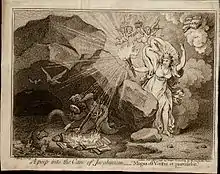Anti-Jacobin Review
The Anti-Jacobin Review and Magazine, or, Monthly Political and Literary Censor (1798 to 1821), a conservative British political periodical, was founded by John Gifford [pseud. of John Richards Green] (1758–1818) after the demise of William Gifford's The Anti-Jacobin, or, Weekly Examiner (1797–1798). Gifford and Robert Bisset were the chief writers, and the political philosopher James Mill wrote reviews. Described as "often scurrilous" and "ultra-Tory," [1] the journal contained essays, reviews, and satirical engravings, notably by James Gillray. It grew out of the political ferment of the period and was a vocal element of the British Anti-Jacobin backlash against the ideals of the French Revolution.

The first edition was published on 1 August 1798 and was advertised in The Times as "containing Original Criticism; a Review of the Reviewers; Miscellaneous Matter in Prose and Verse, Lists of Marriages, Births, Deaths and Promotions; and a Summary of Foreign and Domestic Politics."[2]
Contributors included Robert Bisset (1758/9–1805), John Bowles (1751–1819), Arthur Cayley (1776–1848), George Gleig, Samuel Henshall (1764/5–1807), James Hurdis, John Oxlee (1779–1854), Richard Penn (1733/4–1811), Richard Polwhele, John Skinner (1744–1816), William Stevens (1732–1807), and John Whitaker (1735–1808), though as items were frequently published anonymously attributions are often unclear.
It denounced reformers, especially the Evangelicals, and greatly angered them, as William Wilberforce, a leader of the anti-slavery movement, made clear in 1800:
- It is a most mischievous publication, which, by dint of assuming a tone of the highest loyalty and attachment to our establishment in church and state, secures a prejudice in its favour, and has declared war against what I think the most respectable and most useful of all orders of men--the serious clergy of the Church of England. . . . Its opposition to the evangelical clergy is carried on in so venomous a way, and with so much impudence, and so little regard to truth, that the mischief it does is very great indeed. It accuses them in the plainest terms, and sometimes by name, as being disaffected both to church and state.[3]
References
- John Strachan, “Gifford, William (1756–1826),” Oxford Dictionary of National Biography, Ed. H. C. G. Matthew and Brian Harrison (Oxford: OUP, 2004. Online ed. Ed. Lawrence Goldman. May 2006. 7 May 2007).
- "New Review and Magazine". Classified Advertising. The Times (4235). London. 20 July 1798. p. 2.
- Quoted in Ford K. Brown, Fathers of the Victorians: The Age of Wilberforce (1961) p 187.
Bibliography
- Stephen, Leslie. “Gifford, John (1758–1818).” Rev. Adam I. P. Smith. Oxford Dictionary of National Biography. Ed. H. C. G. Matthew and Brian Harrison. Oxford: OUP, 2004. 7 May 2007.
- Strachan, John. “Gifford, William (1756–1826).” Oxford Dictionary of National Biography. Ed. H. C. G. Matthew and Brian Harrison. Oxford: OUP, 2004. Online ed. Ed. Lawrence Goldman. May 2006. 7 May 2007.
Further reading
- Andrews, Stuart. The British Periodical Press and the French Revolution, 1789–99. New York: Palgrave, 2000. ISBN 0-333-73851-9